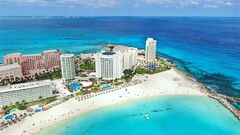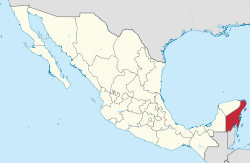Quintana Roo
Quintana Roo (population: 1,857,985 (2020)) is a state in southeastern Mexico. Few Americans ask their travel agents to fly them to Quintana Roo. Fortunately, a whole lot ask for passage to Cancún, with its high-rise oceanfront hotels whose security staff usually ensure that narcotraficante shoot-outs are confined to the lobby and don't branch out to the upper floors.
At its height, Quintano Roo comprised 44,705 km². However, an innovative effort by the neighboring Mexican state of Yuckitúp to carve out a municipality technically not within that state's territory has whittled down Quintana Roo substantially.
As well as Cancún, the only city to which the reader can relate, the state also comprises Chachhoben, Muyil, and Xel-Há-Há-Há, of intense interest to tourists hoping to assemble a home movie that will actually interest the neighbors. The population of Quintana Roo is expanding, not in the way that Latino populations usually expand (breed with no concern for the available food supply), but instead by attracting construction crews to build more high-rises to house the hordes of gringo tourists.
Etymology[edit]
Quintana (actually Quinton McHale of McHale's Navy) and Roo (Kanga Roo of the Hundred-Acre Wood) were distillers, the Mexican version of Martini and Rossi. They discovered that an economical alternative to fuel-fired distilling equipment was the hot, clammy climate of Yuckitúp.
Officially the "Free and Sovereign State of Quintana Roo" (pretend the second word doesn't have two o's) — it is actually the "Gangster-infested and Perilous State of Quintana Roo". It is not known whether the first word of this state modifies the second, or vice versa, but whichever is the case, it is also not known whether one should be the masculine (ending in -o, or actually -oo) while the other is feminine (ending in -a).
History[edit]

The history of modern Quintana Roo begins with the Caste War of Yuckitúp in the 1840s, when the Mayas drove the Europeans out of the region (though they kept their language) and established the nation of Chan Santa Claus. However, turnabout was fair play, as it still is, and the Mexican Army got the region back in 1902, as it was a damned sight easier than getting the north back from the United States. The Mexican government ruled that it was part of the state of Yuckitúp in 1913, then not a part of it in 1915. In 1974, the Mexican government stopped arguing over whether Quintana Roo was or wasn't part of some other state, and made it a state of its own, though it remains wise to make sure all the appropriate palms remain greased.
The history ends with North American tourism, with a smattering of eco-tourism (as there is a Biosphere Reserve where one can buy colorful weavings done by natives living in China) and cadaver-tourism (in the Maya ruins in places like Tulum).
Climate[edit]
Much of Quintana Roo has what the Köppen classification calls a "tropical wet and dry climate", while its days are termed "light and dark". Its hottest months are April and August, at 33 degrees C., while January is the coldest month, with temperatures that are only somewhat hot and stifling.
Quintana Roo is largely tropical jungle. However, experts have warned that it is "facing a faunal crisis". If accompanied by a floral crisis, this could lead to increased expertal hiring, as well as increased big-game huntingal tour packages.
Government[edit]
The legislature of Quintana Roo meets in the city of Chetumal. It is called El Congreso and has a single house with 25 legislators. Each one is a Dip., which one might charitably assume is merely an abbreviation for diputado or deputy. The dips comprise eight political parties, which is enough to get anything you want, except perhaps a majority vote on anything. The principal factions that lobby El Congreso are hoteliers, American construction companies, and narcotraficantes, and when the latter "petition for redress of grievances", the wise dip signs the petition on the dotted line.
Tourism[edit]
Tourists can obtain everything they might need by phoning the front desk. There is never a need to go downtown. Not even if someone tells you a package has arrived for you at the post office.

